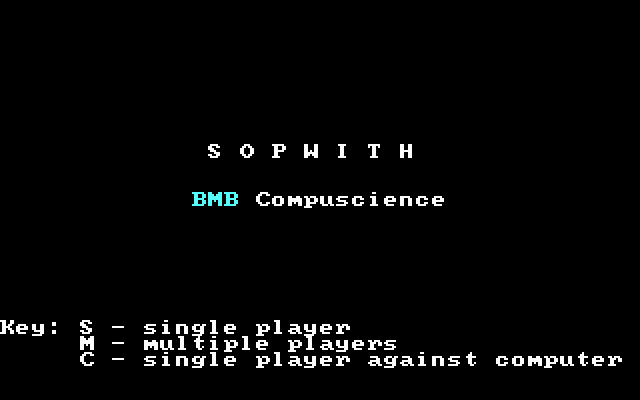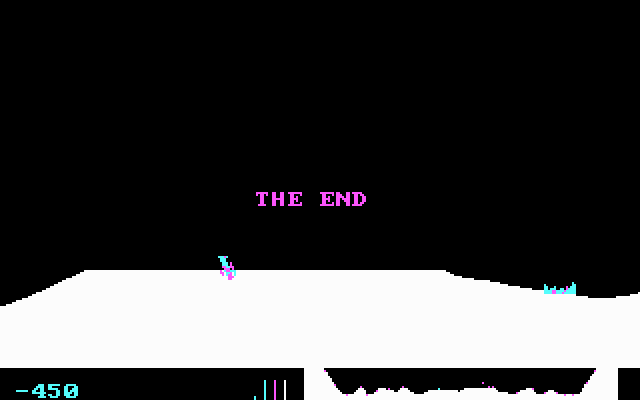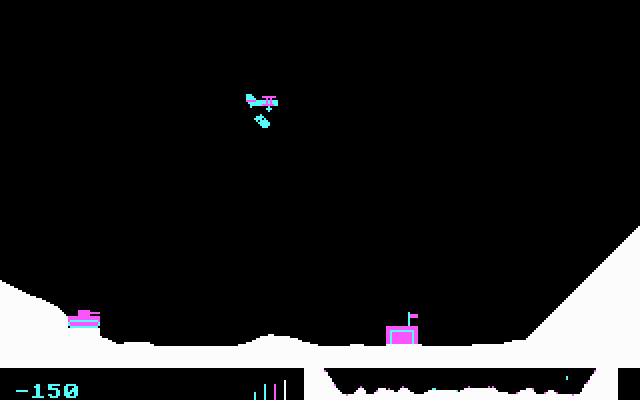Retro Replay Review
Gameplay
Sopwith throws players into the cockpit of a classic biplane, putting aerial combat front and center. From the moment the engine roars to life, you’re tasked with balancing throttle, altitude, and ammunition. The goal is deceptively simple: shoot down enemy planes and destroy all enemy buildings on the battlefield. Yet, mastering the tight controls and timing your attacks requires patience and practice.
(HEY YOU!! We hope you enjoy! We try not to run ads. So basically, this is a very expensive hobby running this site. Please consider joining us for updates, forums, and more. Network w/ us to make some cash or friends while retro gaming, and you can win some free retro games for posting. Okay, carry on 👍)
Single-player missions guide you through increasingly challenging scenarios, introducing stealth targets, anti-aircraft guns, and faster enemy fighters. Each skirmish presents its own puzzle: conserve ammo to take out structures, then pick off straggler planes making their run. The AI may not be revolutionary by modern standards, but it provides enough variation to keep each sortie fresh.
For those craving a head-to-head clash, skirmish mode offers customizable battles against the computer. You can tweak the number of enemy squadrons, adjust difficulty settings, or focus purely on bombing runs. This flexibility ensures Sopwith remains engaging even after repeated playthroughs.
Despite its age, Sopwith’s pacing feels wellbalanced. Dogfights erupt in short, frantic bursts, while bombing missions encourage strategic planning. The combination of reflexive flying and tactical decisionmaking creates a satisfying loop that still resonates with fans of arcade-style flight sims.
Graphics
By today’s standards, Sopwith’s pixelart visuals are rudimentary, yet brimming with nostalgia. The biplane sprite, enemy aircraft, and ground emplacements are rendered in simple colors and shapes. There’s a certain charm in how trees, barns, trenches, and factories are depicted with just a handful of pixels.
Animations are minimal: propellers spin, planes bank left and right, and occasional explosions dot the landscape in bright flashes. While there’s no dazzling particle system or dynamic lighting, the clarity of each element ensures you always know what’s happening on screen. Targets, hazards, and your own plane stand out without visual clutter.
The scrolling background maintains a constant sideview perspective, lending a stable sense of position as you traverse the battlefield. Clouds drift lazily past, and the ground palette shifts subtly to suggest different terrain types. It’s a testament to early ’90s ingenuity that these basic visuals still convey an engaging world.
For many players, the primitive graphics are part of Sopwith’s enduring appeal. The stripped-down aesthetic places gameplay front and center and evokes a bygone era of gaming. If you’re chasing high-fidelity visuals, this isn’t the game for you—but if you appreciate retro vibes, Sopwith delivers in spades.
Story
In Sopwith, narrative takes a backseat to aerial action. You assume the role of an unnamed pilot participating in a generic World War I–style campaign. There are no deep cutscenes or voiced characters; instead, context arises from mission briefs and the visual cues of enemy encampments on the ground.
The simplicity of the premise—fly, shoot, bomb, survive—is both a strength and a limitation. On one hand, it allows players to jump right into the thrills of dogfighting without wading through lengthy exposition. On the other, those seeking a richly woven storyline or character development may find the experience barebones.
That said, Sopwith’s setting captures the essentials of early air warfare. The contrast of fragile woodandcanvas planes against steel fortifications evokes the daring bravery of pioneering aviators. Each mission feels like a brief chapter in a larger conflict, even if the game never spells out its plot in detail.
Ultimately, story in Sopwith is what you bring to it. Veterans of the genre often imagine rival aces, lastminute rescues, or heroic bombing runs creating their own narratives. In this way, the game’s sparse story becomes a canvas for personal storytelling rather than a delivered script.
Overall Experience
Sopwith remains a compelling experience thanks to its tight gameplay loop and vintage charm. Controls are responsive, offering a genuine sense of satisfaction when pulling off a perfect kill shot or weaving around enemy flak. The challenge curve is gradual, ensuring newcomers can learn the ropes while giving seasoned players room to hone their skills.
Replayability is high, especially in skirmish mode where you can experiment with various enemy formations and building layouts. Speed runs, high-score chases, or friendly competitions to see who can knock out the most targets in a single sortie keep the fun alive long after the initial novelty fades.
On modern systems, Sopwith can feel like a quaint relic—but that’s part of its allure. It stands as a snapshot of early computer gaming, reminding players of a time when gameplay depth triumphed over graphical fidelity. Fans of minimalist, arcadestyle flight sims will appreciate its straightforward approach.
For potential buyers, Sopwith offers a quick, addictive dose of dogfighting action. It’s not a blockbuster simulator, but it doesn’t need to be. Its enduring popularity underscores a simple truth: solid, wellcrafted mechanics can transcend decades. If you’re seeking a bitesize taste of WWI aerial combat and a nostalgic trip through gaming history, Sopwith is worth the flight.
 Retro Replay Retro Replay gaming reviews, news, emulation, geek stuff and more!
Retro Replay Retro Replay gaming reviews, news, emulation, geek stuff and more!








Reviews
There are no reviews yet.